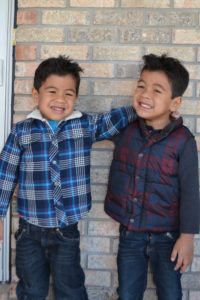 Receiving a referral is no doubt one of the most anticipated milestones during the adoption process. But what comes next? For families adopting from Samoa, we’ve provided a snapshot of what happens once you are matched with a child.
Receiving a referral is no doubt one of the most anticipated milestones during the adoption process. But what comes next? For families adopting from Samoa, we’ve provided a snapshot of what happens once you are matched with a child.
Identifying and referring the Children: In Samoa, the Samoa Victim Support Group (SVSG) is responsible for identifying a child in need of a family and suggesting a proposed match with a waiting family. Once SVSG has determined that there is a child in need of a forever family who meets the characteristics that you are seeking, and it is believed that the adoption would be in the child’s best interest, they will contact our in-country team and MLJ to advise them of the potential match.
Documents provided at referral time: At referral time, adoptive parents are provided with the child’s name, age and the circumstances that led to the child residing at the shelter. The child’s birth certificate is provided, showing birth parent information, if it is available. Medicals of the child are obtained by SVSG or MLJ’s in-country foreign staff, and are also provided at referral time. Lastly, if the child was relinquished by a birth parent, consents are provided to the adoptive family, signed by the birth parent.
Paperwork to Formally Accept Referral: Once you formally accept the referral, you will sign the referral proposal and Commitment to the Child Affidavit.
Legal Process of Adoption in Samoa: Once the referral has been officially accepted, your dossier will be sent to MLJ’s foreign service provider in Samoa. The attorney prepares your adoption petition application and sends it to MLJ via courier service for your original signatures and notarizations. Once signed and notarized, the file will be sent back to Samoa to be filed with the Court. MLJ’s in-country attorney will appear in Court and represent you through a Power of Attorney. Once the petition is filed with the Court, your file is transferred to the Attorney General’s (AG) office for approval of the adoption. For investigation purposes, the AG utilizes the services of the Ministry of Women, Community and Development to investigate and provide a report verifying whether the adoption is in the best interest of the child. Once a favorable report is returned, the AG will issue an approval certificate and the file is returned to the Court. The Court, at its discretion, will issue the Adoption Order approving and finalizing the adoption.
Complete Immigration: Once your Adoption Order and post adoption birth certificate has been issued, for U.S. families, your next step is to file the I-600 (“Petition to Classify Orphan as an Immediate Relative”). For Canadian families, you will apply for your LONI or LONO, and once this is received you will file your Part Two Immigration application in Australia. MLJ will assist both U.S. and Canadian families in preparing the dossiers that must be submitted with these applications.
Travel to Bring Your Child Home: When you travel, you are the legal parents of your child or children! For Canadians, your child’s visa is mailed from Australia to Samoa and only one trip is required to Samoa to bring your child home to Canada. U.S. families are required to travel to Samoa first, then onto Auckland, New Zealand for visa processing.You will be with the child the entire time during your stays in Samoa and New Zealand. Our in-country team in Samoa will ensure you have a driver to take you to all necessary appointments and excursions. For U.S. families traveling to New Zealand, no in-country staff will be available; but New Zealand is easy to navigate. For Canadian families the trip to bring your child home should be 5-7 days. For U.S. families the trip will take 2-3 weeks.
While the process to bring a child home from Samoa can be long, it’s worth it! Twenty-eight children have joined their forever families from Samoa, to U.S. and Canadian families. Each of these children face a better future because of the love and care they will receive in their adoptive families.
